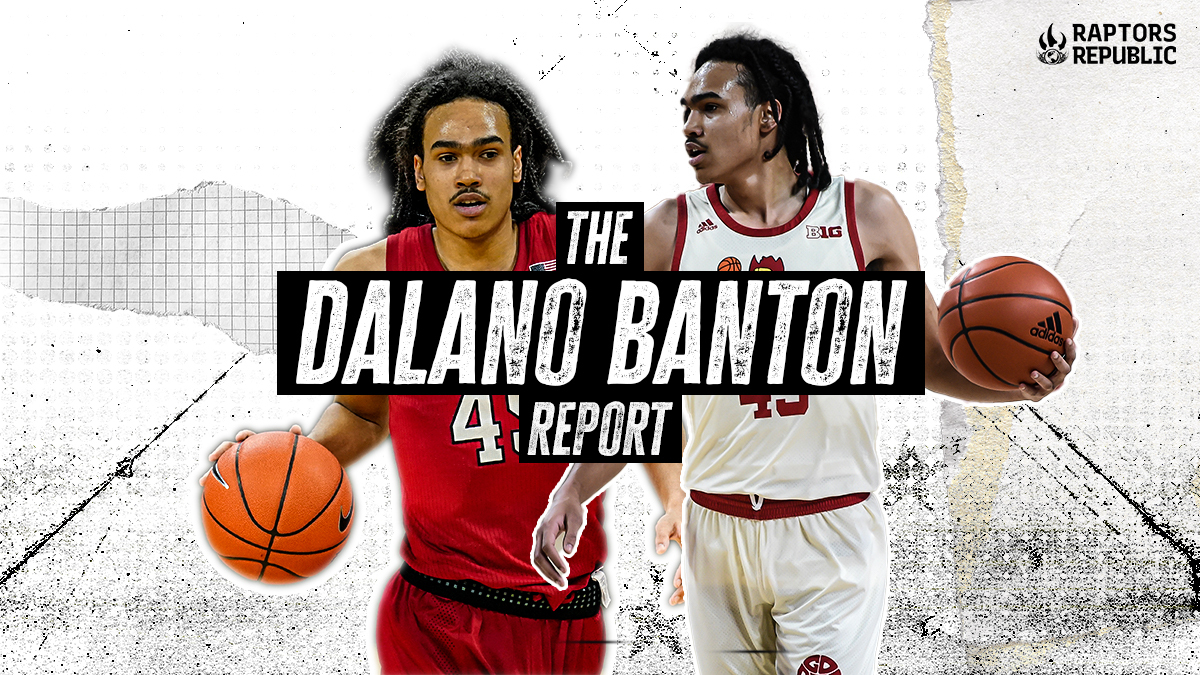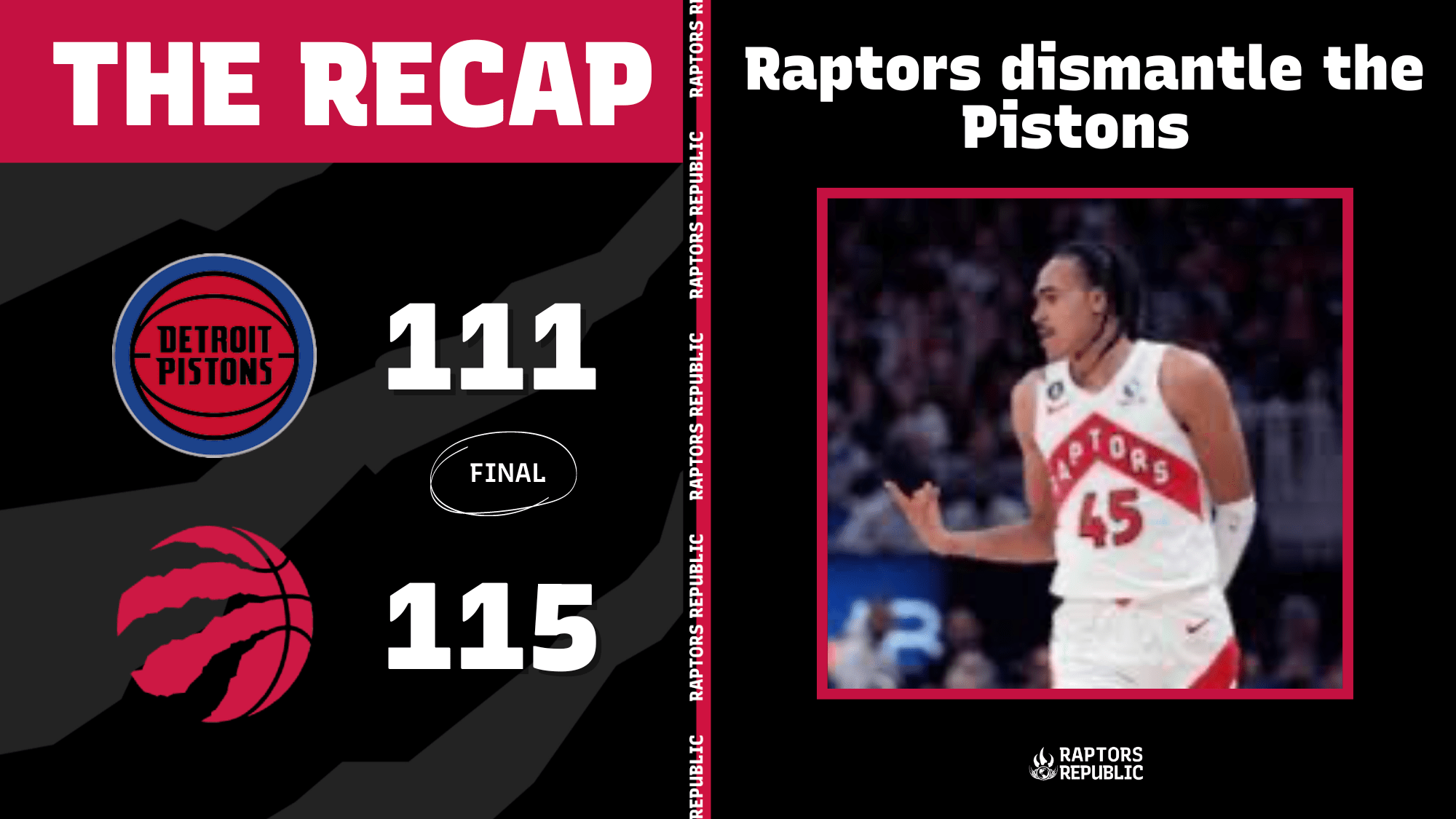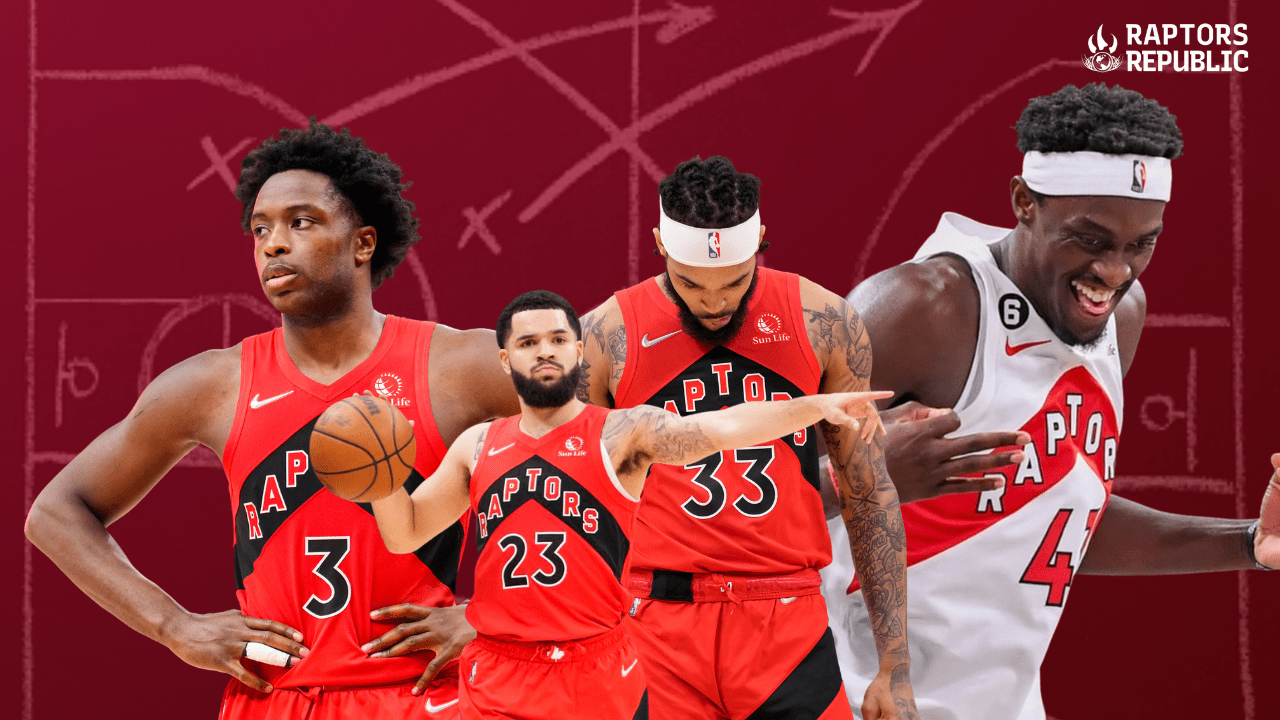The first game Dalano Banton started in the NBA was an unmitigated disaster. The 2021-22 Toronto Raptors, when at their most broken due to injury and illness, walked steadily to the executioner’s block and met their fate: A 45-point loss to the Cleveland Cavaliers. Banton scored seven points in 23 minutes and recorded three turnovers and six assists. Facing the Detroit Pistons — and with the Raptors again missing a huge portion of the top of their rotation — Banton made sure the Raptors were the executioners rather than the executed.
To be fair, the situations were not quite the same. Toronto’s most established player in Banton’s first start was Chris Boucher, followed by Yuta Watanabe. Against the Pistons, the Raptors were equipped with Scottie Barnes and O.G. Anunoby. Both have been up and down as offensive initiators, but they are miles ahead of anyone the Raptors had in Banton’s first star. But perhaps the most significant difference was Banton himself.
Banton started relatively cold against the Pistons, but he didn’t allow that to change his process. He has sometimes turned to a habit of passivity when he doesn’t make his first look or two, and because defenders don’t respect his jumper (more on that in a moment) a passive Banton can handicap an offensive possession. When he’s at his best, he’s crashing the offensive glass, extending his drives to the rim, cutting willy-nilly, and mad-dashing in transition.
Indeed, Banton missed his first shot, a triple. But then he gathered a defensive rebound and attacked three defenders by himself on the break, forcing the ball into the rim through a solid contest. He’s not a brilliant dribbler in tight spaces, but his length and speed are more impactful in transition than his handle is limiting. Even more impressive though: the fact that he didn’t let his earlier miss impact his confidence and aggression.
Then, though, he committed two turnovers and had a layup blocked. Last season’s Banton — even last week’s Banton — might have turned tail and tried to do less on the court. But he just doesn’t offer enough as a passive, static player. Not in this one.
Banton finished a cut with pace, receiving the ball from a Marc Gasol-esque Thad Young for the easy layup. Then came the real payoff, with him drilling a catch-and-shoot triple. He finished shooting 3-for-7 from deep (one miss was on a deeep, hanging buzzer-beater heave attempt), which massively boosts his value on the court. To start the game, defenders were ignoring him behind the arc. To close, he was drawing helter-skelter closeouts and still drilling jumpers. Combine that with his other strengths, and Banton would have been hard to keep off the court had Toronto been entirely healthy.
Banton was actually less effective on the defensive end than the offensive as a rookie. He didn’t always follow the schemes, and he was an easy target on or off the ball. But against the Pistons, his defense almost outshone his offense. (Almost.) As an on-ball defender, Banton stuck with Killian Hayes at one point during multiple side-to-side moves and then blocked him straight up at the rim. He followed that up with a pick-six a few possession later. He picked up dribblers full court and didn’t give up blowbys. He was handsy on drives. He finished with three steals and two blocks, but even more important than the counting stats was the fact that he was far from a defensive target.
Banton’s best work came in the fourth quarter. He threw a picturesque alley-oop to Boucher in transition for the dunk. He drilled a triple and isolated to hit a midrange jumper. He dunked in transition and assisted a Barnes dunk in transition. Later, with the Pistons clawing their way back to a four-point game, Banton played a clever two-man game with Thad Young in a late clock situation, drew both defenders as he extended for the layup, leaving Young for the uncontested tip-in. Banton later closed out the game with four made free throws.
On October 5, when I dove into Banton inching his way towards rotation playability, I wrote this:
“Banton doesn’t need to revolutionize his game to become a contributor. He’s such a strong rebounder and connective passer that his strengths will always be positives. He just needs to chisel away at his weaknesses to the point where they don’t overwhelm the rest of his game. Banton probably isn’t going to become a traditional point guard who comes in off the bench and runs the halfcourt offense. If that is going to be in the cards, it’s a long way down the line. For now, Toronto would be thrilled for a 12-minute-a-game wing who forces turnovers on the defensive end, finishes in transition, and moves the ball with rapidity.”
He was surely more than that against the Pistons. The connective passing was there — at one point he turned a second-side drive into a dump-off pass to Barnes for the dunk. The transition play was there, both as a scorer and a passer. And his downsides were nowhere in sight; he committed just two turnovers despite handling the ball for much of the night. (And in truth, neither of the turnovers were his fault, one coming on a wraparound pass to the corner for a shooter that should have been deeper, and the other coming on a bizarre carry call that didn’t impact the game at all.) His defense was spectacular rather than a weakness.
The fact that Banton’s jumper fell lifted his ceiling far beyond my original expectations. That won’t be the case every night — he’s up to a solid-but-not-great 35.5 percent from deep on the season. (As an aside, his jumper looks significantly improved, with his elbow much, much straighter.) And his craft with the ball in his hands, as a pick-and-roll creator, was far above his standard output. (It helps to play the Pistons, truly.)
Sure, the Raptors were without a parade of their best players. (The injured squad of Fred VanVleet, Pascal Siakam, Gary Trent jr., Precious Achiuwa, and Otto Porter jr. would run the healthy squad out of the gym in an open scrimmage.) But the game was nothing like its comparative last season. Banton made sure of that.
He finished with 27 points, 4 rebounds, 4 assists, 3 steals, and 2 blocks. He won’t have the opportunity to perform such heroics every night, and nor will he consistently perform at such a high level in the minutes he does receive. But our expectations of what a Banton explosion would look like were themselves blown out of the water. He almost doubled his previous career high of 14 points. He dominated in virtually every facet of the game.
As a result, Banton turned Toronto’s losses into his gains … and Toronto’s gain, ultimately. That won’t happen every night. But add it to the collection of worthwhile lessons Toronto is acquiring during this period of injury. And that’s the point of the regular season for a team like Toronto: to prepare for the playoffs — and Banton’s career night positions him as a useful piece in the future. But most importantly, to enjoy the games as a means in and of themselves. And Banton’s career night certainty made an otherwise ordinary game against the Pistons on a Monday night extraordinary.



